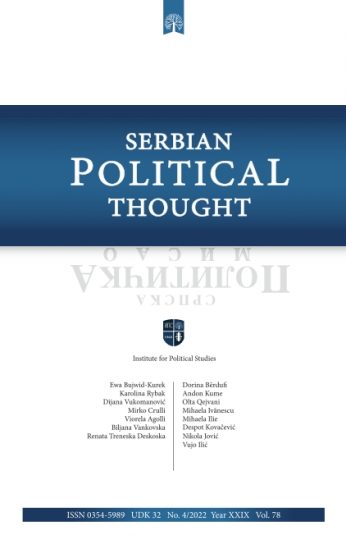Main topic
Serbian Political Thought
Challenges of Modern Age in the Field of Work-family Reconciliation Policies in Serbia
Abstract
The challenges faced by modern countries have influenced the change of priorities in social policies and, in this context, also in family-related policies. As we know, labor market opportunities and possibilities for working parents are not solely the reflection of a country’s economic situation. Cultural aspects of a country and working parents’ individual characteristics also have an impact on their position in the labor market. Support provided by the state to working parents is another determining factor in their position and viability on the labor market. Because of that, institutional arrangements in this area are very important and they present an intervention field in most European countries, including Serbia. Taking that into account, a frequent topic of public debate is the question what models should be put in place in order to assist parents to enter and remain in the labor market there continuing to fulfil their family responsibilities. The key question of this assignment is to analyze the status of working parents and challenges they face in their efforts to strike a balance between family commitments and work obligations.
References
- Batak, (2014) Usklađivanje privatnog i profesionalnog života Studija većih privatnih firmi u Srbiji. Beograd: Ministarstvo za rad, zapošljavanje, boračka i socijalna pitanja.
- Blagojević Hjuson, M. (2012) Rodni barometar u Srbiji: razvoj i svakodnevni život. Program Ujedinjenih nacija za razvoj, Beograd: UN Women.
- Blagojević, Hjuson, M. (2014) „Transformacija roditeljstva poluperiferijska perspektiva“ in: Sociologija, LVI(4):pp. 383-402.
- Blagojević,M. (1997) Roditeljstvo i fertilitet, Srbija devedesetih. Beograd: Institut za sociološka i kriminološka istraživanja.
- Dobrotić, I. (2015) „Politike usklađivanja obiteljskih obaveza i plaćenog rada i položaj roditelja na tržištu rada“, in: Revija za socijalnu politiku, 22(3): pp. 353-374.
- Gudac Dodić,V. (2009) „Žena u socijalizmu“. Beograd: Institut za noviju istoriju Srbije.
- Kolin, M. (2009) Rodne nejednakosti na tržištu rada u Srbiji i podsticaj evropskih integracija. Beograd: Evropski pokret u Srbiji.
- Kronja, J., Avlijaš, S. Matejić, V. (2015) Strategija Evropa 2020: četiri godine kasnije: vodič. Beograd: Evropski pokret u Srbiji.
- Milić, A. (2006) „Porodica i modaliteti radnih aktivnosti članova, promene u toku postsocijalističke tranzicije u Srbiji od 1991-2006 godine“, in: Društvo u previranju sociološke studije nekih aspekata društvene transformacije u Srbiji (priredila Smiljka Tomanović). Beograd: Institut za sociološka istraživanja Filozofskog fakulteta: pp. 57-79.
- Perišić, N.(2010) „Položaj žena na tržištu rada rodna perspektiva „država blagostanja“, in: Socijalna misao, 65(5): pp.123-138.
- Perišić,N. Vidojević, J. (2015) „Responses of the Serbian Welfare State to the Global Economic Crisis“ in: Revija za socijalnu politiku, 22(2): pp.177-194. doi: 10.3935/rsp.v22i2.1209.
- Stupar, M. (1963) Socijalna politika. Beograd: Rad.
- Šobot, A. (2012) „Tri demografske posledice rodno specifičnih modela ponašanja na primeru Srbije“, in: Stanovništvo 2/2012: 85-109.
- Tanasijević, J. (2016) Doktorska disertacija: Politike usklađivanja porodičnih i profesionalnih obaveza u Srbiji. Beograd: Fakultet političkih nauka.
- Addati, L. (2015) „Extending maternity protection to all women: Trends, challenges and opportunities“, in: International Social Security Review, Vol. 68(1): pp.69-93.
- Bonoli,G. (2007) „Time matters: Postindustrialization, new social risks and welfare state adaptation in advanced industrial democracies“, in: Comparative political studies 40(5): pp. 495-520.
- Dhembo, E. (2007) „Zapošljavanje žena uloga politika usklađivanja radnih i porodičnih obaveza u Albaniji“. In: Vuković, D. Čekerevac A. (eds.) Socijalna politika i socijalne reforme, Beograd: Fakultet političkih nauka. pp.166-182
- European Commission (2010) “Gender Equality in the EU in 2009”. Luxembourg: Office for Official Publications of the European Communities.
- Eydal Gudny , Rostgaard, T. (2011). Gender Equality Revisited Changes in Nordic Childcare Policies in the 2000s, in: Social Policy and Administration 45(2): pp.161-179.
- ILO (2010) Maternity at Work: A Review of National Legislation. Geneva: International Labour Office, Conditions of Work and Employment Branch Second edition.
- Lewis, J. (2009) Family Balance, Gender and Policy. Northhampton Massachusetts: William Pratt House.
- Maskalan, A. (2016) „In the Name of the Father: A Discussion on (New) Fatherhood, Its Assumptions and Obstacles“, in: Revija za socijalnu politiku, 23 (3): pp. 359-382.
- Morgan, K. (2015) Promoting Social Investments Through Work-Family policies: Which nations do it and why, [online]. Available at: http://www.ulster.ac.uk/cpsp/files/2014/09/spa-papers-6.pdf [Accessed: November 15, 2015].
- OECD, (2008) Babies and Bosses: Balancing Work and Family Life OECD Policy brief. Paris: OECD.
- OECD (2011) Doing Better for Families. Paris: OECD.
- Republički zavod za statistiku (2007) „Anketa o radnoj snazi ARS“. Beograd: RZS.
- Republiški zavod za statistiku (2014) Žene i muškarci u Republici Srbiji. Beograd: RZS.
- Republički zavod za statistiku (2015) Statistički godišnjak Republike Srbije 2015. Beograd: RZS.
- The Labour Law. Official Gazette of the Republic of Serbia, numbers 24/05, 61/05 and 54/09.
- The Law on Financial Support to Families with Children. Official Gazette of the Republic of Serbia, numbers 16/02, 115/05 and 107/09.
- UN Women Policy (2014) The Global Economic Crisis and Gender Equality. New York: UN WOMEN.

